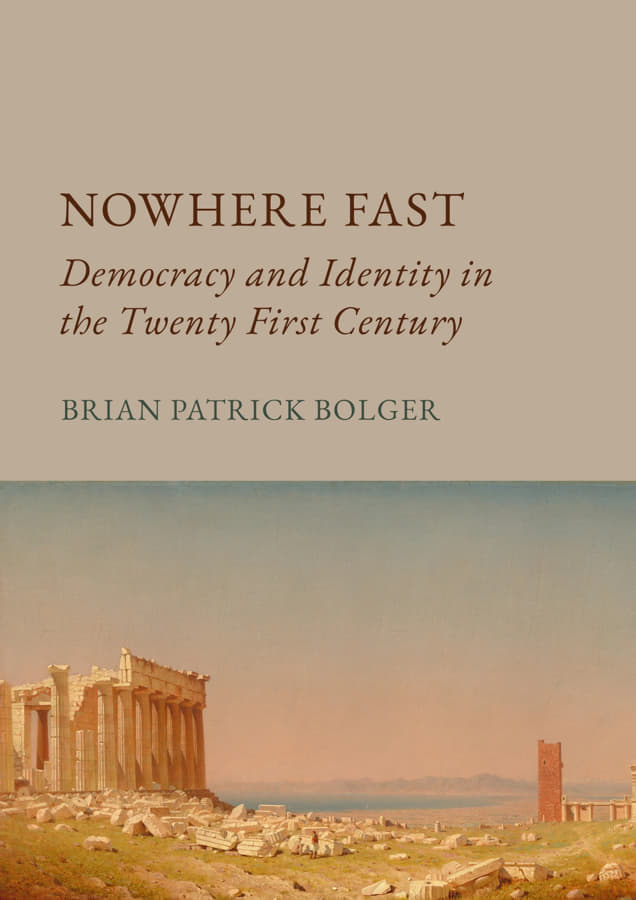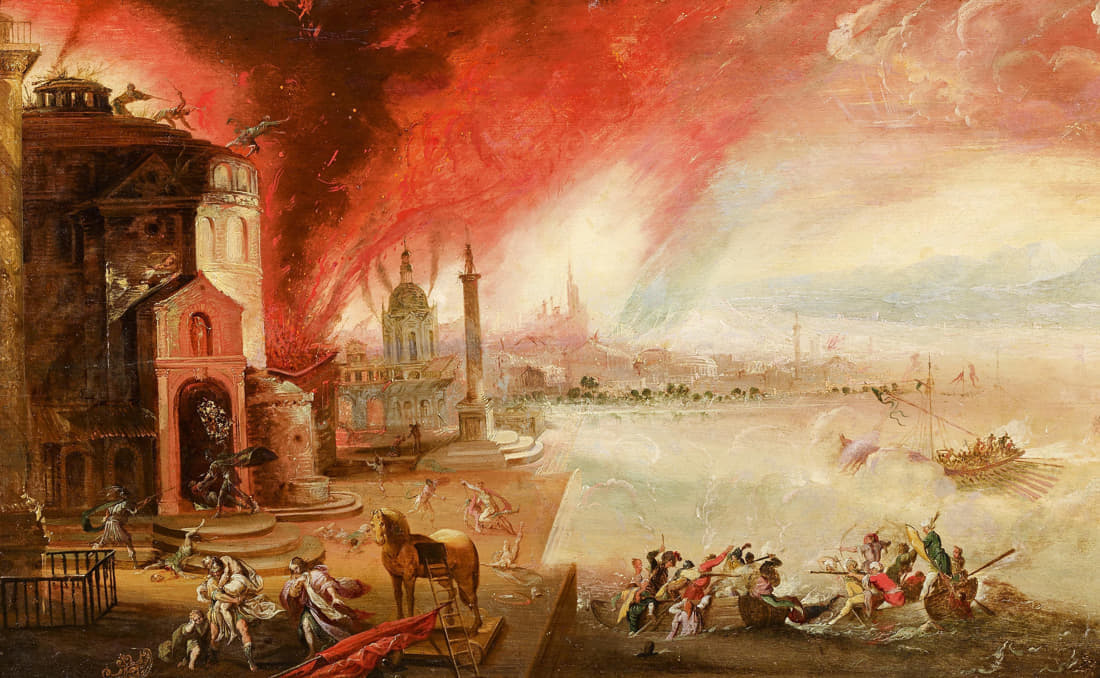The latest book by Brian Bolger has just been published. Nowhere Fast. Democracy and Identity in the Twenty First Century is a close and thorough analysis of the structural and cultural decline of western democracies, particularly the UK. The book examines the economic crisis of globalization, the emergence of a new “knowledge class,” and the phenomenon of populism. We are happy to bring you an excerpt from it.
Please consider supporting this worthy work by purchasing a copy and spreading the word.

There seemed to be an inevitability in the talk of globalisation and the ‘end of history’ which ushered in the twenty first century. This emanated from the post World War 2 era of New Deals and free trade, and of a dollar hegemony supposedly built on a dichotomy of liberalism and democracy. There was a broad consensus amongst academics and liberals, combined with a myopic belief in the progressive benefits of technology, that a brave new world consensus was forming and that war and discontent was ebbing away like the tide from an old broken Empire.
Economists tend to measure globalisation in ‘Trade in Goods’ and FDI (Foreign Direct Investment) flows across borders. Yet this is like sailing a passenger ship in the North Atlantic with ‘Icebergs’ disabled from the navigation system. There are Icebergs floating around… and lots of them. ‘Trade Openness’ (calculated as Exports plus Imports as a % of GDP) grew steadily from 1945 onward. It reached its peak in approximately 2005 and has since begun to tumble. There is now a trend to onshoring with the dual impacts of Covid and Ukraine. There are declining rates of return on investments and the problems of geopolitical uncertainty. The world, effectively, is splintering into blocs (Grossraums, ‘great spaces’) and the result is chauvinistic assertion manifested in military conflicts. But the reasons for the collapse of interrelated economies goes deeper. It is not purely economic. There is an underlying shift in what Carl Schmitt called the ‘Nomos of the Earth’.
Whilst the twentieth century may have been one of globalisation and trade, it was also one of a ‘total mobilisation’ of resources and human resources for a system of capital accumulation – which heaps excessive demands on international relations.
In political philosophy it often takes a period of nuanced reflection to assess the real ‘telos’ or ‘nomos’ of what occurred before or what is transpiring. At first Colonialism appears as a philanthropic and mercantile escapade. The ‘nation state’ appears to be the solution to the Holy Roman Empire and the despots of monarchical Europe. Democracy appeared to be the solution to the woes of the nineteenth century. However, when the dialectic unfolds, we are left with the real ‘Nomos’ (law, ‘lex’ in Latin or ‘right to the land’). The ‘Nomos of the Earth’ was the concept which Schmitt outlined which, having begun with the discovery of the ‘New World,’ the Americas replaced the ‘Old World’ of Europe and Asia. The ‘nomos’ is the real title to land, to a culture, and it is beyond International Law. In this however came the ambivalent nature of US policies of interventionism and isolationism. Establishing an American ‘Grosssraum’, as in the Monroe Doctrine, becomes problematic. The maritime Empire of the British was another ‘Grosssraum’. The nation state, however, works in contradistinction to this reality. It only works out in an international system of agreed law, of equal liberal nation states. When this breaks down, we have the polarisation of ‘Grossraums’ and the casualties of diminutive nation states. So ‘nomos’ means the real original title to land and when conflicts arise, it is usually a consequence of this disputed title, as in the Ukraine or Israel, or in Taiwan.
From the Middle Ages there developed a code of civil and ecclesiastical law to regulate conflicts of Church, Republic and Prince. The Holy Roman Empire acted as a type of ‘Katechon’ or protector against the antichrist. It was therefore more of a guiding ethos, or telos regarding Empire, an ideology even. The ascendancy of nation states in the nineteenth century sees the demise of the ‘Katechon’ or ethos. As in Washington’s final address the emblem of the modern era becomes ‘As little politics as possible, as much trade as possible’. So, nation states become largely conduits for trade, for globalised trade. Such a myriad of conflicting interests, mostly economic, has resulted in a ‘forgetting’ or rational/technical society without an underlying ethos. Now civilisational states, such as Russia’s ‘Holy Rus’, Chinese ‘Tianxia’, or Islamic states see themselves as unified (however corrupt). The American ‘Grossraum’ on the other hand, consists of liberal contradictions, the weakness of representative government, a confusion of foreign policy and an anarchic domestic world of anomie. Yet the liberal elites act as though they hold some higher moral ‘progressive’ framework. Hegel had said that there was no real American ‘state’, that it lacks a commonality of culture.
It is not in effect a process of deglobalisation which is occurring, but the fundamental dissolution of the de facto independence of nation states and its replacement with regional Grossraums, akin to Empire. The current dying pains of economic globalism are ringing around the world. Notions of International Law break down when its implementation is unequal and sporadic or when the civilisational states and empires resent encroachment. Schmitt envisaged, presciently, a world, not of globalisation, but one of differentiated ‘Grossraums’. He contrasted fixed ‘culture’ states such as Germany with flighty mercantile sea empires such as Great Britain. Land based realms, close to the soil, to nature are more stable. Again, there is a contrast between Kantian notions of universal international states based on a system of International Law and its opposite in civilisational Eurasian states who emphasise local and particular cultures. The Westphalian world, which ushered in the modern notion of nation states is under threat. The problem for modern nation states is that the sovereign no longer is able to wield the ‘exception’, to secure the safety of the state. This is due to the decadent form of liberalism which runs amok inside nation states. The absolutely sovereign Hobbesian state is in abeyance. The liberal state, based on economy, rationalism and progressive universality is unable to defend itself. The Katechon is under threat, not ostensibly from warring civilisational states, but from inside.
The liberal and Marxist world envisaged an unfolding progress to a Utopian end of history schema and its naivete is now visible. It is more akin to Hegel’s development of spirit but one rooted in nature and culture. The liberal world must accept the particularity of cultures and their equal jurisdiction; there is no universal human rights, no good and evil. Man has moved from land to sea to air, to space. Yet we need to return to the land and a ‘jus gentium’ (law of nations) based on natural law rather than positive law which protects peoples rather than land borders. This, in itself, involves a sea change to real democratic participation in the polis and a move away from nationalism to community. In the middle ages there was a recognition of an authority that existed, be it the Emperor or the Pope, and an informal common law. There were no wars between states, only competition between nobles. They largely concerned the pushing out of terrain rather than defending ‘borders’. We are now encompassed by borderlands and all its ensuing strife and war. Modern globalisation only concerns matter rather than spirit. Competition between modern states is delineated by a type of economic piracy. We have a version of maritime colonialism dressed up as globalisation. It is merely the naming which has changed.
This international sea like empire is rootless. It imagines ownership of titles rather than ownership of culture. It is extractive rather than productive or creative. It provokes ‘ressentiment’ from the poor and disenfranchised. It creates borders and division because it has no underlying theology. The theoretical underpinning of the Chinese’Tianxia’ (all under heaven) of a cultural Chinese empire is its, according to the Chinese, opposite. In this argument the empire must understand the relevant cultures it ascribes to. It is not one off dominion but understanding, however far-fetched that might seem with the present Chinese incumbents.
War has an economy of its own. When the underlying ‘telos’ to nation states is economic only, then this permeates all aspects of life. It is like a plague of sorts jumping from one realm to another: it invades healthcare, education, and war. So, war has become Keynesian in an era of diminishing capital rate of returns ( r>g). Capital follows a pattern of osmosis- seeking any host. Stocks in defence industries are booming. There seems to be no limits on technology and capital. War is not incidental to the modern era – it is a fundamental part of the ‘wealth of nations’. An International Court of Justice should be based on fundamental natural law, not allied to political institutions and particular states. Multicultural states are unrooted and their capital elites unmoored. There is in essence a dysfunctional quality to modern occidental states. Economy must be subservient to theology and telos.
Much of modern and late modern conceptions of Democracy and Identity are general, universal assumptions about how scientific research is done. Scientists and liberal philosophers start from the premise of how things ‘should’ be, not about what they, in fact, are. Our quest, then, is to find this dominion and how ‘Being,’ as an ontological concept, is not objective or fixed, but phenomenological, that is it is local and particular, in flux all the time. This conception nullifies any universalist attempts to ‘categorise’ or objectify other cultures. It therefore renders invalid much of the liberal assumptions on universal law, democracy, human rights and identity.
The map of the dominion, I believe, can be travelled in four domains, that of Political Economy, the ‘Polis’ (Democracy), Elites and Identity, although they all share common terrain. We follow Clifford Geertz in ‘believing, with Max Weber, that man is an animal suspended in webs of significance he himself has spun. I take culture to be those webs, and the analysis of it to be therefore not an experimental science in search of law but an interpretive one in search of meaning.’ Therefore, I approach these subjects from the position of phenomenological description and hermeneutics to give access to meaning. Since Plato, philosophers have established forms, or categories, noumena or Gods, as a framework of usurping nature. These ‘systems’ have imprisoned culture in artificial reason or metaphysics, divorced from nature, from the reality of good and evil. By analysing a ‘forgetting’ of the underlying assumptions of morality (and how they have been overtaken by reason), democracy and identity can be removed from obscurity, from a hermeneutical hiding since the Enlightenment.

